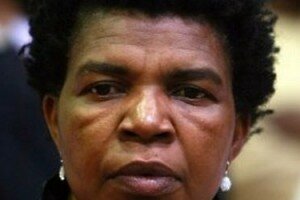
bdlive.co.za
Minister Pule and the DoC have been enduring ongoing attacks by opposition parties, notably the Democratic Alliance (DA), claiming the department fails to respond to parliamentary questions and is shirking important developmental issues.
However, it is not only rivals that suffer disregard by the minister. In addition to ignoring parliamentary questions, Pule also refuses to answer requests for information put to her by the media, on behalf of the public at large.
Pule has still refused to answer questions put to her by HumanIPO, in spite of having finally agreed to do so on February 22 - after a string of unanswered emails and phone calls - and promising a response no later than February 26. The DoC has now resorted to ignoring requests for information.
At the recent Digital Television Summit, held in Johannesburg in March, the DoC representative failed to show up, leaving conference attendees frustrated in their attempts to gain access to official information from the DoC, many having hoped to have their questions answered in person.
The minister appears to be pursuing a secretive policy of non-information and non-communication.
In the role of communications minister - not to mention as a member of parliament - Pule has responsibilities to the public that she in principle should be serving.
These responsibilities include providing a transparent account of her department’s activities and spending, as well as ensuring the most pressing issues are accorded priority in the department’s work.
The minister fails miserably on all of these counts.
HumanIPO can only infer from the minister’s silence that she is not willing to reveal what exactly the DoC is working on. This would be worrying in itself, even without numerous revelations and allegations of Pule’s wrongdoing.
A South African High Court recently found the minister guilty of acting outside the remit of her powers in awarding the control of set-top boxes to Sentech.
One such finding having been made, the public should expect the minister to be forthcoming in proving the rest of her conduct is within appropriate boundaries, to reassure the public she serves.
Furthermore, extremely worrying allegations surrounding the ICT Indaba held in June of last year remain unresolved, the minister failing to answer HumanIPO questions on her involvement in the Indaba and updates on the work and conclusions of the task team set up to investigate the Indaba being non-existent.
These examples only hint at the mystery which surrounds the work of the DoC under Pule’s guidance.
As to supporting the country’s development by ensuring the correct priorities, Pule’s department has been seen repeatedly re-prioritising funds away from projects such as job creation within the ICT sector and supporting community based ICT initiatives, due to “other spending pressures”.
The minister recently revealed her five strategic priorities to parliament, which included broadband rollout and the impending digital migration - two areas in which she can boast of very little progress.
The DoC has spent the past year dragging its feet with respect to broadband, citing the need to revise the broadband policy, while the industry regulator has admitted it is unlikely the country will meet the 2015 digital migration deadline.
Pule needs to start acting with the professionality her position calls for, and treat the public with the respect they deserve by making her department transparent and acting on priority issues which will spur the economy and the population’s prosperity.





















































